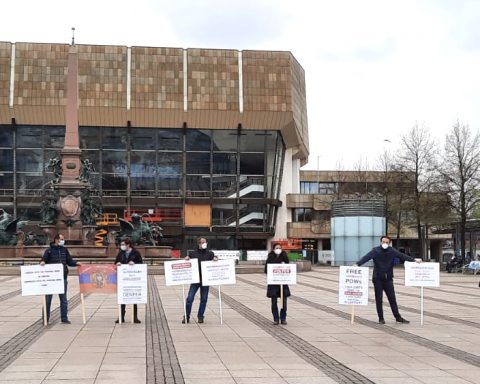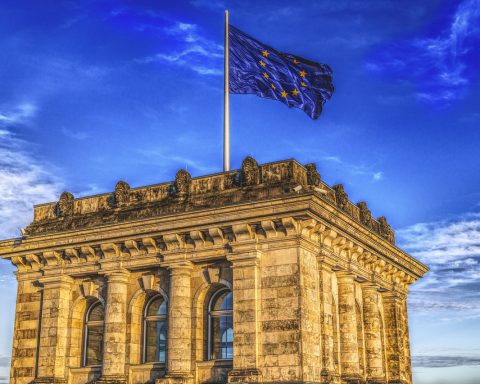Enough talk about wanna-be strongman Donny Trump. Let’s focus on actual dictators and their favorite sporting events: sham presidential elections.
Egypt will hold its presidential election in March of this year, where President / General / Pharaoh Abdel el-Sisi will stand for re-election. So will Russian (and American) President Vladimir Putin in May. He has been, directly or indirectly, at the helm of this nuclear superpower for almost two decades. The month before, April, Die Linke’s leftist dictatorial darling – Venezuelan Caudillo Nicolas Maduro – will also seek re-election.
What these (sham) elections have in common is not the fact that they take place back-to-back or that the incumbents seek re-election, but that they all look like the race scene of The Dictator starring Sacha Baron Cohen.
In the scene, the dictator of the fictitious oil-rich country tailors the race to his benefit: It looks like a competitive race, but The Dictator will win regardless. This is a painfully accurate visual description of the upcoming presidential elections in Egypt, Russia and Venezuela. The incumbents will compete for votes, but their victories are all but assured. Their opponents get banned, jailed, and in some cases shot. They are all sham elections designed to paint an aura of legitimacy, not to give a say to the people of their countries on who will head their governments.
Egypt’s new pharaoh
The BBC recently published a great in depth story of El-Sisi’s violent and paranoid crackdown on political dissidents. Even people who so much as walk by a protest in the street can be arrested and tortured, and disappear, at the hands of security guards. He has used the fight against Islamic terrorists to his political advantage, much like Bashar al-Assad in Syria.
The government banned the Muslim Brotherhood in 2013, after El-Sisi, as former head of the Army, overthrew the democratically elected, but politically inept, government of Mohamed Morsi. The main political opposition group in Egypt, the Muslim Brotherhood are Islamist because of their belief in making Islamic teachings the founding principles of the Egyptian Republic. Recently, they have been engaging ISIS-affiliated armed groups in the Sinai Peninsula, which gives the government a great excuse to expand politically-motivated crackdowns.
Heading into the sham presidential elections, El-Sisi is once again cracking down on his major political opponents. In January, the Egyptian security forces arrested the former head of the Armed Forces, Sami Anan, after he declared his intention to challenge El-Sisi in the polls. he was the only contender with the necessary backing (in the population and in the all-powerful Egyptian Army) to unseat El-Sisi from power.

From Russia with 65% of Love
The Russian government has barred the main opposition leader Alexei Navalny from running in this year’s presidential elections. He has been jailed and released so many times by security forces that he may have trouble sometimes knowing whether he is at home or in a prison cell. Navalny is the only popular political opponent of the mighty Putin, and with him out of the picture, re-election is guaranteed: Putin currently polls at over 65 percent in the intention of vote.

To be fair, the American… sorry… I mean, the Russian President, is ridiculously popular in Russia. Over 50 percent of Russians say that they have strong confidence in Putin’s ability as leader, while another 20-something percent say that they have some confidence in his ability. Donald Trump won the American presidency with less than 50 percent approval (and some help from Putin).
Even if Putin has repeatedly used autocratic methods to stay in power, he does have some claims of legitimacy. However, that does not excuse his government’s undemocratic behavior towards political opponents.
Hyper-inflated dictatorship in Venezuela
Latin American military dictatorships have been out of fashion for a while, but the Maduro government is trying to make them hip again. Oil-dependent Venezuela has descended into full autocracy, after the economic crisis affecting the country since the fall of oil prices at the end of 2014 led to a series of economic events ending in hyperinflation.

The country’s inflation rate is about 4000 percent by some estimates (official data has not been released). Hyperinflation in real terms translates to hunger; people are dying of hunger. This occurs as the Venezuelan government cannot subsidize the prices of foodstuffs or pay for imports, because oil money is no longer there, and what money is left goes to the military. The military benefits from the economic crisis, as Maduro’s government relies on it to maintain its political stability, which means getting control of important sectors like the state oil company.
Presidential elections were constitutionally due to take place at the end of the year, but the government called for them to take place in May – before the economic crisis deepens even more, and early enough to prevent the necessary checks and monitoring processes designed to assure a fair election.
Maduro recently said: “You want me to give [opposition parties] electoral guarantees so that they can beat me? Never!” Moreover, the government has barred, jailed, or exiled all major oppositions leaders, in similar fashion to Egypt and Russia. Only 29 percent of Venezuelans plan to vote in the upcoming elections, which shows the lack of faith in the process. If this is not the definition of a sham election, I do not know what is.
Egypt, Russia, and Venezuela will not hold competitive elections, but that doesn’t mean that they are boring. Like reality TV, sham elections are disgusting shows that we can’t help but watch.
Editor’s note: We value diversity in opinion. The views of our columnists and guest writers do not necessarily express those of The Leipzig Glocal. We accept opinion piece proposals at contact@leipglo.com.









